Bupleurum extract relieves heat stress in dairy cows
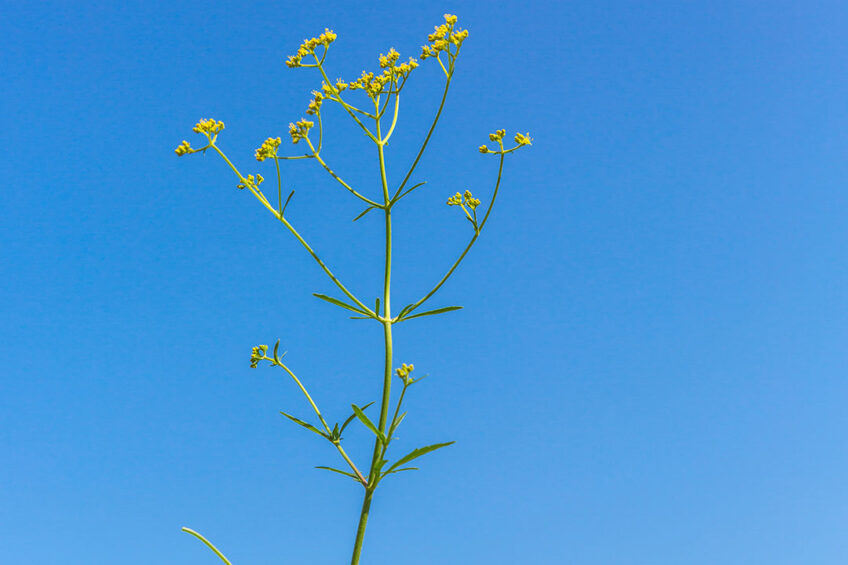
Heat stress in dairy cows is caused by an imbalance between heat accumulation and heat dissipation in a hot environment. In this study, researchers bring to light the beneficial effects of Bupleurum extract in heat-stressed dairy cows.
Nutritional solutions complement environmental control measures to curb the effects of heat stress in dairy cows. The genus Bupleurum belongs to the plant family Apiaceae and is widely distributed in the Northern Hemisphere. Recent studies have shown Bupleurum extract has immunomodulatory, anti-inflammatory, anti-tumour, antioxidant, antiviral, antibacterial, and other pharmacological effects. Its main active ingredient is saikosaponin, known to have anti-inflammatory effects by inhibiting the expression of inflammation-related factors and increasing the expression of anti-inflammatory cytokines.
The negative impact of heat stress
Heat stress affects lactational performance as seen through the reduction in milk yield; with the reduction in feed intake caused by heat stress, meeting the energy demands of a high-producing cow is a challenge. On the reproduction side, studies show that heat stress may alter the duration of oestrus, uterine function, endocrine status, follicular growth and development. Extended periods of heat stress can also affect early embryonic development and survival, foetal growth, and colostrum quality. On cow welfare, change in the behavioural patterns of cows following heat stress is a common tool for identifying poor health and welfare. Previous studies show that as ambient temperature increases, dairy cows will reduce lying time by 30% to increase body surface area for heat dissipation; measures of lying behaviour are an important indicator of cow comfort and provide valuable information on how cows interact with their environment. Increased standing time is an important indicator of cow welfare, and is associated with decreases in milk production, and disease prevalence. In a previous study (Figure 1), researchers reviewed the effects of different ambient temperatures.
Figure 1 – Thermoneutral zone (TNZ), lower critical temperature (LCT), and upper critical temperature (UCT) of a lactating dairy cow.
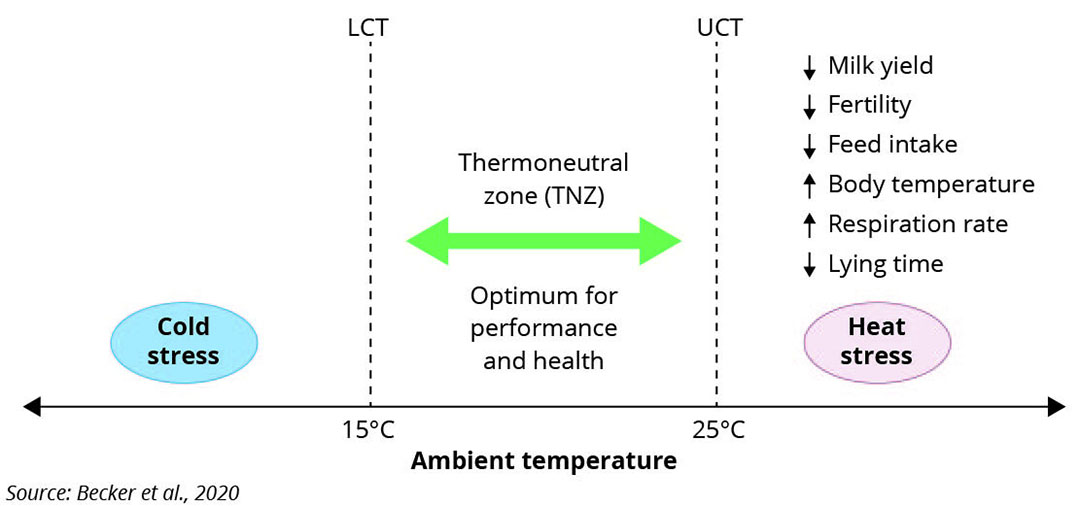
The Bupleurum study
Researchers investigated the effects of Bupleurum extract (BE) on the haematological profiles, mineral metabolism, and hormone levels of heat-stressed dairy cows. Heat-stressed Holstein cows were randomly divided into four groups, with 10 cows in each group. The groups:
- Group 1: cows fed a basal diet without BE addition (control group),
- Groups 2-4: Cows fed a basal diet with either 0.25 g BE/kg DM, 0.5 g BE/kg DM, or 1.0 g BE/kg DM.
Impact on immune response
The innate immune system is the primary defence mechanism for animals to protect against and cope with environmental stressors. The innate immune function is suppressed in lactating cows during heat stress, which can lead to an increase in the risk of clinical diseases such as mastitis and metritis. Heat stress can lead to an increase in reactive oxygen species (ROS), which leads to the attack of free radicals on the erythrocyte membrane and causes the lysis of red blood cells (RBC). On the other hand, heat stress could increase serum osmotic pressure, decreasing the mean red blood cell volume and white blood cells (WBC). In the current study, supplementation with Bupleurum extract increased the RBC, WBC and platelet counts. In line with this, the researchers observed increases in haemoglobin, haematocrit (ratio of red blood cells to total blood volume), and the mean erythrocyte haemoglobin concentration.
The RBC count was positively correlated with haemoglobin and haematocrit, implying both haemoglobin and haematocrit recovered with the recovery of the RBC count after BE supplementation. It was concluded Bupleurum extract ameliorates the haematological profiles of heat-stressed dairy cows, with an optimal dose of 0.5 g/kg DM basis recommended.
Mineral metabolism
Studies show that heat stress cause decreases in serum Na and K and plasma Ca levels in dairy cows. Supplementation of the extract increased K, Ca and Cl in the serum, while the Na levels were slightly lower than in the control group. Researchers suggested the higher K and lower serum Na concentrations of dairy cows that were fed the extract may be due to the interaction between the saponins and the erythrocyte membranes, leading to the formation of pores in the membrane and making it permeable to ions, especially to the diffusion of Na from the plasma to the RBC and the diffusion of K from the RBC to the plasma.
Serum enzymes
Heat stress causes the excessive accumulation of triglycerides and cholesterol in the liver of dairy cows, affecting the normal metabolism of the liver, and causing liver damage. Liver damage results in an increase in serum enzymes glutamic-pyruvic transaminase, glutamic-oxaloacetic transaminase, alkaline phosphatase, and creatine kinase levels. The addition of BE significantly reduced the content of these enzymes in the serum (Table 1), showing protective effects on the liver under heat stress and maintenance of optimal amino acid metabolism; glutamic-oxaloacetic transaminase and glutamic-pyruvic transaminase are important intermediate enzymes in amino acid metabolism, and alkaline phosphatase is involved in vitamin B6 metabolism.
The decrease in creatine kinase levels following BE supplementation was attributed to the extract promoting glycolysis in heat-stressed dairy cows, as creatine kinase reduces the production of ROS (reactive oxygen species) through coupling with ATP.
Serum hormonal levels
Supplementation with Bupleurum extract increased the levels of T3, insulin-like growth factor 1, and prolactin, and reduced the levels of cortisol and heat shock protein 70 (HSP70). Triiodothyronine (T3) is a reliable indicator of long-term heat stress; following heat stress, the level of T3 decreases. It was stated: “It could be that BE stimulates the function of the peripheral tissues of dairy cows and converts a large amount of T4 into T3 in these tissues.” On the other hand, prolactin is a polypeptide hormone with immunomodulatory effects; studies show that it promotes breast development, milk synthesis, and the maintenance of milk secretion under heat stress.
The NEB caused by heat stress increases the concentration of cortisol and heat shock proteins. Under heat stress, HSP70 plays a vital role by preserving the stability of the cytoskeleton, regulating the cell cycle and the immune response, preventing cell apoptosis, and contributing to the thermotolerance of cells. The alleviating effect of BE on heat stress is reflected in the sparing effect it has on cortisol and HSP70.
“Overall, these changes following supplementation with Bupleurum extract are the manifestation of the recovery of the pathological state of dairy cows that suffered from heat stress,” the researchers concluded.
Article is based on the research paper “Effects of bupleurum extract on the haematological, mineral, and hormonal profiles of heat-stressed dairy cows”. The paper can be accessed via the Italian Journal of Science vol 22, 2023 issue 1.
 Beheer
Beheer


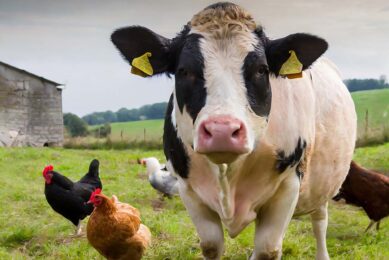
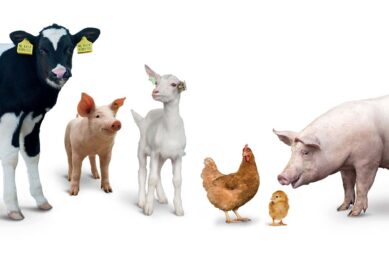
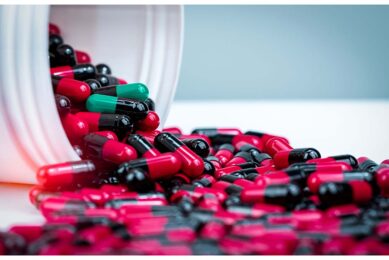
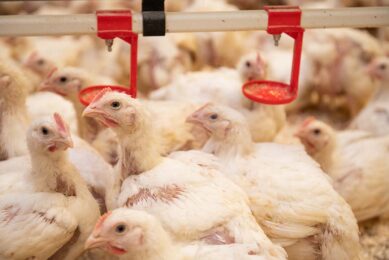
 WP Admin
WP Admin  Bewerk bericht
Bewerk bericht